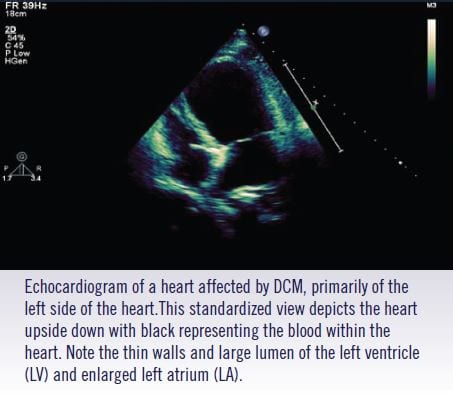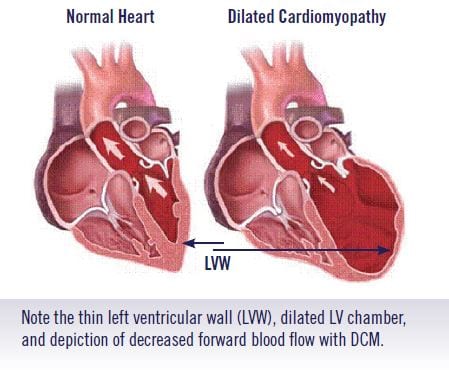Dilated Cardiomyopathy (DCM) in Dogs
What is Dilated Cardiomyopathy (DCM)?
- Heart muscle disease that causes loss of heart muscle strength, enlargement of the heart, and a decreased ability to pump blood through the body(heart failure).
- Dilated Cardiomyopathy affects any age dog, but occurrence increases with age.
- Heart failure can be compared to a common pump. If the sump pump in your basement fails, water backs up into the basement; if the left heart fails, fluid backs up into the lungs; if the right heart fails, fluid backs up in the belly.
- Irregular heartbeat (arrhythmias/abnormal electrical activity) can be a life threatening complication of this disease.
What causes DCM?
- Dilated Cardiomyopathy occurs in families of dogs. The exact genes and/or modes of inheritance have not been fully defined and research on this continues.
- Doberman Pinscher and Great Dane are often affected.
How is DCM Diagnosed?
- Through a cardiac evaluation and echocardiogram (sonogram of the heart) performed by a board-certified dog cardiologist like those at CVCA.
- Holter monitors are often required to check the dog’s heart rhythm over 24 hours. These devices are worn by the patient in a small backpack and usually are well tolerated.
How is DCM in Dogs Treated?
- The specific treatment is tailored to the individual patient.
- Oral medications are most commonly used and many are the same as those used for people with heart disease.
- Therapy improves the heart’s ability to pump and controls the signs of congestive heart failure.
- Treatment extends the life of the patient while allowing the pet excellent quality of life.
- Some patients also need medications to improve their heart rhythm. These medications are crucial to minimize the risk of arrhythmias and sudden death.


